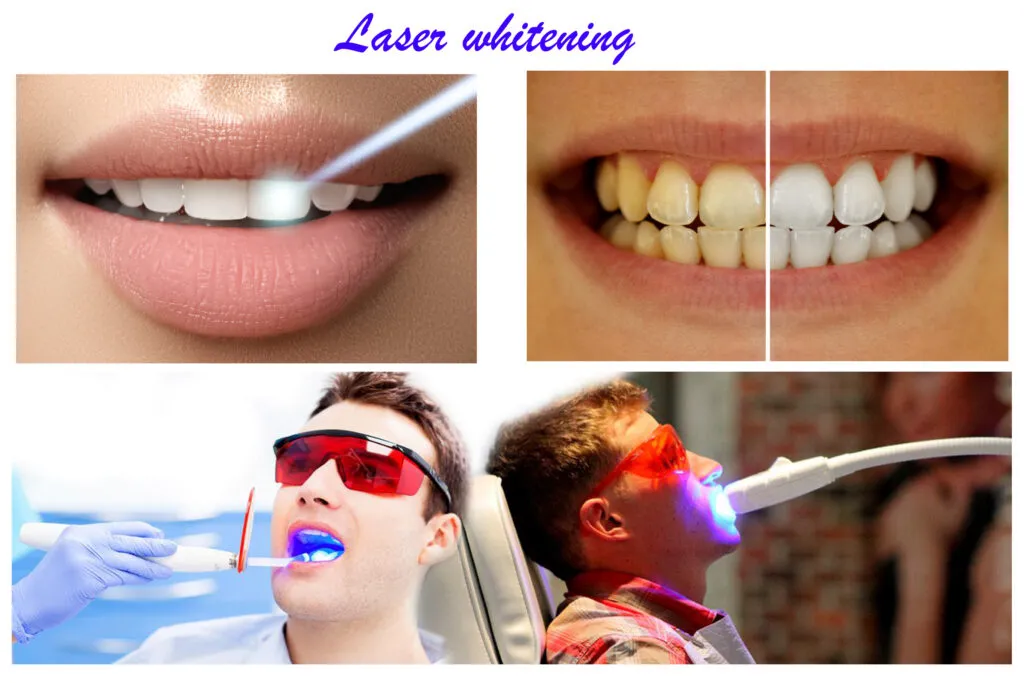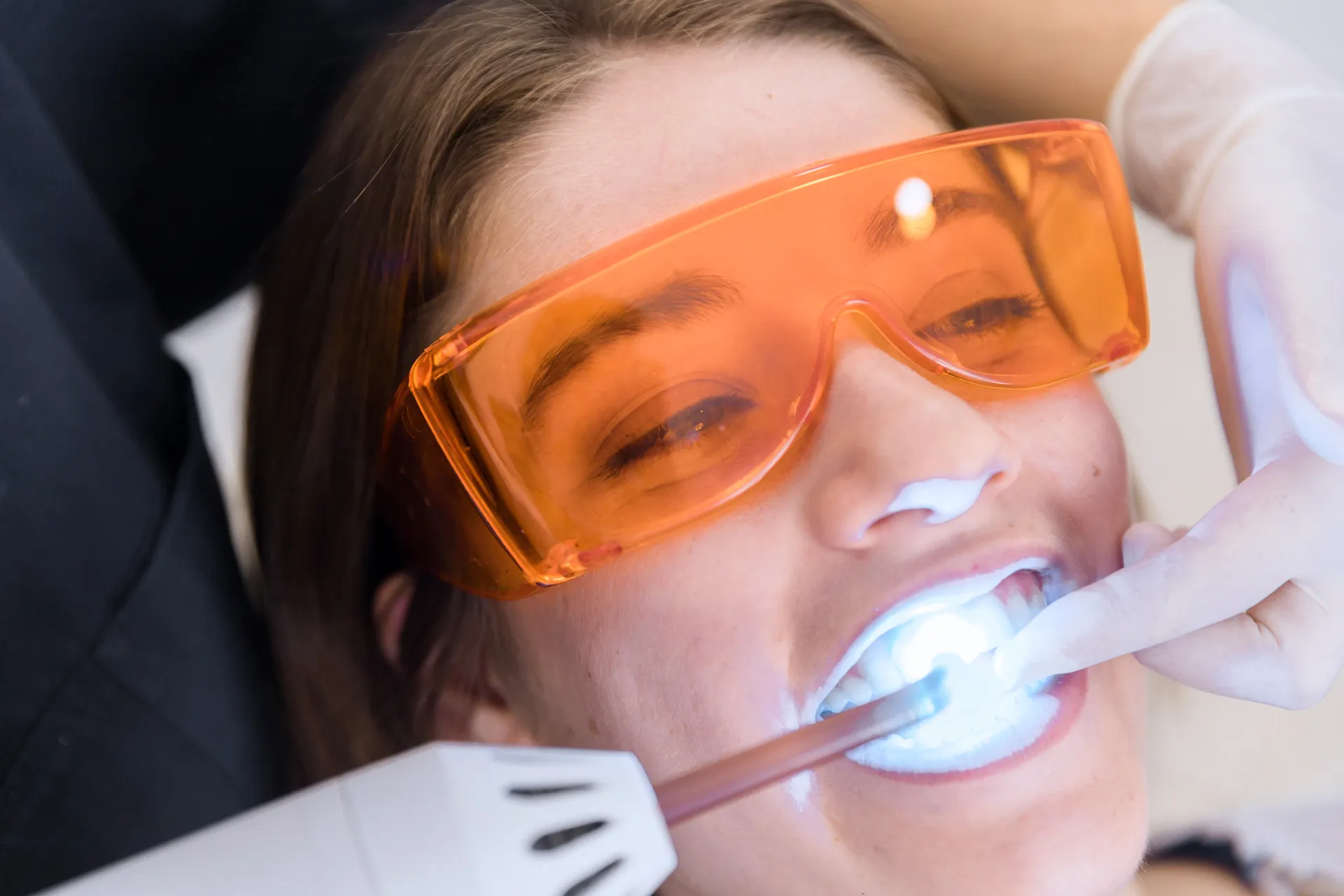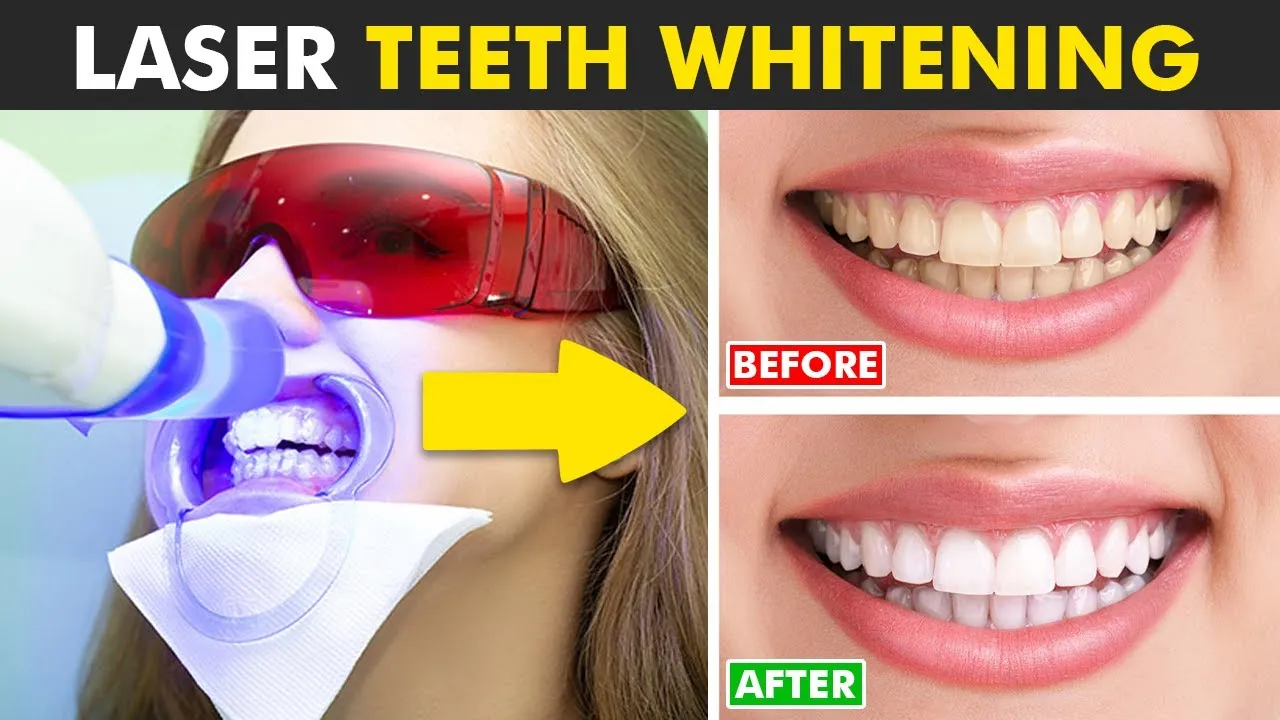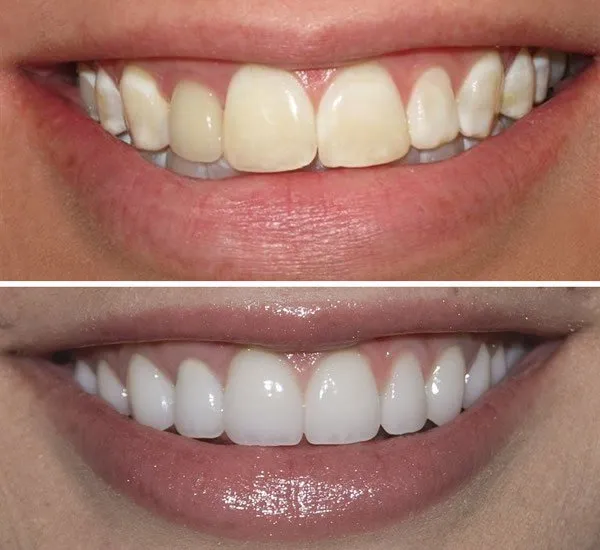What Is Laser Teeth Whitening
Laser teeth whitening, often referred to as in-office teeth whitening, is a cosmetic dental procedure designed to lighten the shade of your teeth. Unlike over-the-counter whitening products, laser teeth whitening is performed by a dental professional, ensuring a more controlled and effective process. This treatment utilizes a high-intensity laser light to accelerate the bleaching process of a whitening agent, typically a hydrogen peroxide solution, applied to the teeth. The result is a noticeably brighter and more dazzling smile, often achieved in a single dental visit. This procedure has become increasingly popular due to its efficiency and dramatic results. It offers a quick and convenient way to enhance your smile and boost your confidence.
How Laser Teeth Whitening Works
The effectiveness of laser teeth whitening lies in the synergy between the bleaching agent and the laser light. The process begins with the application of a strong whitening gel, usually containing a high concentration of hydrogen peroxide, to the surface of the teeth. The dentist carefully ensures that the gel covers all visible surfaces, avoiding contact with the gums to prevent irritation. Once the gel is applied, a special laser is directed at the teeth. The laser’s energy activates the whitening agent, accelerating the breakdown of stains and discoloration on the enamel and dentin layers of the teeth. This process allows the whitening agent to penetrate the enamel more effectively, breaking down the stain molecules and leading to a brighter, whiter smile. The laser light is carefully controlled to ensure the safety and comfort of the patient.
The Procedure Step by Step

The laser teeth whitening procedure typically unfolds in a series of carefully executed steps, ensuring both safety and optimal results. First, the dentist or dental hygienist will clean your teeth to remove any plaque or surface stains, preparing the teeth for the whitening process. A protective barrier is then applied to the gums and soft tissues around the teeth to shield them from the bleaching agent. Once the protective measures are in place, the whitening gel is applied to the surface of the teeth. The laser is then used to activate the gel, and the process is repeated in cycles, usually lasting around 15 to 30 minutes per cycle, depending on the desired level of whitening. After the final cycle, the gel is removed, and your teeth are rinsed. Your dentist may apply a fluoride treatment to help reduce sensitivity and strengthen the enamel.
Preparation Before Laser Teeth Whitening
Preparing for laser teeth whitening involves several key steps to ensure the best possible outcome and minimize potential side effects. First, it’s crucial to schedule a consultation with your dentist. During this visit, your dentist will assess your oral health, discuss your expectations, and determine if laser teeth whitening is suitable for you. They may also recommend a professional cleaning to remove any surface stains and plaque, allowing the whitening agent to work more effectively. If you have any existing dental issues, such as cavities or gum disease, these will need to be addressed before the procedure. Avoid consuming staining foods and drinks, like coffee, tea, and red wine, in the days leading up to your appointment to maximize results. It’s important to be realistic about the results and understand that the final shade of your teeth can vary.
Aftercare Tips for Laser Teeth Whitening
Proper aftercare is crucial to maintaining your bright, white smile and prolonging the results of laser teeth whitening. For the first 24 to 48 hours after the procedure, it’s essential to avoid foods and drinks that can stain your teeth. This includes coffee, tea, red wine, dark sodas, berries, and heavily pigmented sauces. Opt for a ‘white diet’ consisting of white or light-colored foods, such as chicken, fish, rice, pasta, and dairy products. It is important to maintain good oral hygiene by brushing your teeth twice a day with a non-abrasive, whitening toothpaste. Floss daily to remove food particles and plaque from between your teeth. Avoid smoking and using tobacco products, as these can quickly stain your teeth. Regular dental check-ups and cleanings are also essential for maintaining your results and overall oral health. Consider using a whitening toothpaste or mouthwash to further enhance and maintain your results.
Benefits of Laser Teeth Whitening

Laser teeth whitening offers several significant benefits, making it a popular choice for those seeking a brighter smile. The most obvious benefit is the dramatic improvement in the appearance of your teeth, resulting in a noticeably whiter and more radiant smile. This cosmetic enhancement can boost your self-confidence and self-esteem, leading to a more positive self-image. The procedure is typically quick, often completed in a single dental visit, making it a convenient option for busy individuals. Laser whitening is highly effective in removing stains caused by aging, tobacco use, coffee, tea, and certain foods. In addition to cosmetic benefits, whiter teeth can contribute to a healthier-looking appearance and a more youthful look. The immediate results provide instant gratification, leaving patients feeling satisfied and empowered by their enhanced smiles.
Potential Risks and Side Effects
While laser teeth whitening is generally safe, it’s essential to be aware of the potential risks and side effects. The most common side effect is temporary tooth sensitivity, which can range from mild to moderate and usually subsides within a few days. Gum irritation or inflammation can occur if the protective barrier isn’t properly applied, although this is rare. In some cases, patients may experience mild discomfort or tingling in their teeth during or after the procedure. Over-whitening can result in a chalky or unnatural appearance, so it’s important to discuss your desired shade with your dentist. It’s important to note that whitening treatments are generally less effective on dental work like crowns, veneers, and fillings, and these may need to be replaced to match the new tooth shade. Individuals with pre-existing dental conditions, such as cavities, gum disease, or cracked teeth, may experience more significant side effects.
Who Is a Good Candidate
Laser teeth whitening is suitable for a wide range of individuals, but certain factors can make a person a better candidate for the procedure. Ideal candidates are those with healthy teeth and gums and those who have surface stains or discoloration caused by aging, food, drinks, or tobacco use. Individuals with realistic expectations regarding the results are more likely to be satisfied. It is important to note that the procedure is most effective on natural teeth and may not significantly whiten existing dental work. Individuals with sensitive teeth may need to take extra precautions or consider alternative whitening methods. People with significant dental issues, such as cavities or gum disease, should address these concerns before undergoing laser teeth whitening. Consulting with a dentist is essential to determine if laser teeth whitening is appropriate for your specific needs and oral health.
Cost of Laser Teeth Whitening

The cost of laser teeth whitening can vary depending on several factors, including your location, the dentist’s fees, and the extent of the treatment. Generally, in-office teeth whitening is more expensive than over-the-counter options due to the professional expertise and advanced technology involved. The price can also vary depending on the number of sessions needed to achieve the desired results. It’s important to discuss the cost with your dentist during your consultation and inquire about any payment plans or financing options they may offer. Remember that the investment in laser teeth whitening can provide long-lasting results, boosting your confidence and improving your overall appearance. When comparing costs, consider the potential benefits, such as the convenience, effectiveness, and professional guidance provided by the procedure.
Alternatives to Laser Teeth Whitening
If laser teeth whitening isn’t the right choice for you, several alternatives are available. Over-the-counter whitening products, such as whitening strips, gels, and toothpastes, are a more affordable option and can be used at home. However, these products may not be as effective as in-office treatments. Custom-fitted whitening trays, provided by your dentist, allow you to apply a professional-strength whitening gel at home, offering a more effective option than over-the-counter products. Professional teeth cleaning can remove surface stains and improve the overall appearance of your teeth. Veneers or dental bonding are cosmetic procedures that can cover stained or discolored teeth, providing a permanent solution. The best alternative depends on your specific needs, budget, and oral health. Discuss these options with your dentist to determine the most suitable approach for achieving a brighter, whiter smile.
In conclusion, laser teeth whitening is a highly effective and efficient way to achieve a dazzling, sparkling smile. This procedure, performed by dental professionals, offers significant benefits, including dramatic results in a short amount of time. While it’s essential to be aware of potential risks and follow aftercare instructions, the boost in confidence and improved appearance make it a worthwhile investment for many. From understanding the procedure to considering the alternatives, this guide provides the key information to help you make an informed decision about laser teeth whitening and achieve the smile you’ve always desired.
